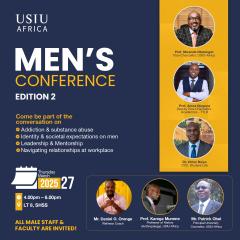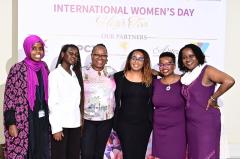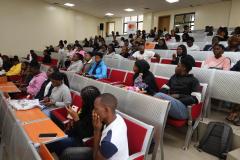Statement by H.E Hon. Musalia Mudavadi, EGH. Prime Cabinet Secretary and Cabinet Secretary Foreign and Diaspora Affairs on Kenyas Grand Strategy in a Changing World Delivered at United States International University -Africa (USIU-Africa), March 21, 2024
The University Leadership,
Professors,
Students,
Members of the USIU Community,
Ladies and Gentlemen, good evening.
I am pleased to have you all here. Thank you all for turning up.
Allow me to begin by congratulating the university management, the leadership, faculty, students and the USIU fraternity for inviting me to this beautiful and coveted institution to share my ideas on the Kenya’s Grand Strategy. I am honoured to have been invited and indeed pleased to be here to raise discussions on a topic of great significance to our nation. This is yet another opportunity to come here since the last time I was invited by the former VC Prof. Freida Brown. Therefore, for this opportunity, I specially thank Prof. Munene Macharia for inviting me.
In speaking about Kenya’s grand strategy in a changing world, I have structured my presentation into four parts. First I will explore the context of the international relations environment that portrays the changing world. Second, I will interrogate the concept of grand strategy, its evolution and how I consider it in the contemporary international relations. Next is to present Kenya’s grand strategy given the evolving global arena, and finally wrap up with brief remarks on Kenya’s foreign policy priorities and the centrality of our national interests.
- An overview of the international environment
- As they say, “wisdom is to live in tune with the mode of the changing world”. Therefore, I want to discuss Kenya’s Grand Strategy in the changing world, but before I do, let me take a few minutes to give an overview of the international environment within which Kenya’s grand strategy is envisaged and implemented.
- Today, international relations are at a turning point in history. Indeed, it is becoming clear that the global balance of power is transforming. The world is experiencing a shift in global order as new alliances and rivalries emerge. The old unipolar or bipolar order has given way to the forces of the next world order. The emerging powers, new actors, evolving interests, and the assertiveness of developing states are recalibrating the global status quo.
- We are witnessing a more complex and fragmented world system, where global multilateralism is on the verge of crisis and is beckoning reforms. Global governance is increasingly being distorted and weakened by the pressure of unilateralism and protectionism. States, especially leading powers, continue to undermine international organizations and institutions in pursuit of their short-term geopolitical interests.
- The global powers are embroiled in mischievous and dangerous intrigues, pursuing unilateralism, and militarism hence undermining the global values and established international relations principles of human solidarity, human rights, sovereignty, rule of law, democracy, and diplomacy. The outcome is diminished global leadership and a lack of collective approach to global crises such as the COVID-19 pandemic, the Ukraine war, and the Gaza crisis. The latter has spilled into the Red Sea crisis which is now threatening our region’s maritime strategic interests.
- Increasingly, states are beset with global dangers such as violent extremisms, inter-state violent conflicts, climate change risks, pandemics, the proliferation of weapons of mass destruction, and economic volatility among other severe human security threats. Additionally, states across the world find themselves in a complex situation of competition, confrontation, and cooperation. As such, rising and traditional powers are currently engaged in a new scramble for Africa literally transforming the continent into a new theatre of Cold War resurgence. Consequently, the region and continent are becoming vulnerable to geopolitical manipulations by these competing powers.
- We need to be cautious as a continent since this new scramble for Africa and indeed the renewed zero-sum Cold War mentality will potentially fragment the region and weaken African regional organizations such as AU, IGAD, and EAC among others.
- Under these circumstances, Kenya must pursue a robust, pragmatic, and strategic foreign policy hinged on diplomatic wisdom and tact. Kenya will endeavor to lead the region and continent in rallying a common and well-coordinated diplomatic response to the new scramble and geopolitical influences by emerging and traditional powers. This is to ensure the security and prosperity of our people, as well as promote regional cooperation and peaceful co-existence for mutual benefit.
- The concept of Grand Strategy
- Ladies and gentlemen, at this point, let me now interrogate the concept of grand strategy. Since conceptually, grand strategy is all-encompassing, my focus will be on the grand strategy for foreign relations which is not only restricted to military or defense strategy but includes a wide range of international activities that are aimed at advancing Kenya’s strategic interests in the global arena. The aim is to highlight certain issues that will inform your academic debate later.
- In an ever-evolving global arena, a grand strategy enables the country to develop anticipatory policies that will empower it to navigate the dynamic landscape of 21st-century international relations.
- Historically, grand strategy was more concerned with military sources of power to pursue and secure national interests. However, today, non-military sources of power have increasingly become essential. These include diplomacy, economy, and technology. Thus, in the contemporary world, a grand strategy is not only for war times but also during peace and development.
- Notably, militarization in foreign policy seems to be yielding ground to geoeconomics. Even as some actors continue to use force as a means of global influence, geo-economics is largely being embraced where states focus on the use of economic tools such as trade policies, foreign investment, global financial systems, economic sanctions, foreign aid and grants to promote and defend their national interests and achieve imperative geopolitical objectives.
- The ‘grandness’ of the strategy is based on the fact that the policy goals and interests are long-term rather than immediate or short-term. In sum, our collective policy strategies constitute a grand strategy. Our grand strategy employs economic, diplomatic, defence, technological, and other means to achieve foreign policy objectives. We as policy practitioners and government seek to manage and maximize all state resources (which by the way are limited), in achieving Kenya’s national interests. And an efficient way of doing this is through a grand strategy.
- Anyway, I just noted that the term grand strategy is absent or not frequently used in media and public policy discourses. Apparently, it remains confined to academic debates. (as we are doing now). Therefore, today’s topic is timely. It speaks to the need to ignite public discussions on grand strategy beyond academia. We need to be strategic in our foreign policy projection in this rapidly changing world that is said to be volatile, uncertain, and ambiguous.
- Kenya’s grand strategy in a Changing World
- Ladies and gentlemen, let me now narrow down to Kenya’s grand strategy in the evolving world system. From this end, I can confirm that Kenya’s foreign policy outlook is replete with opportunities and risks that are being shaped by global critical geopolitics. So a grand strategy is a necessity for the survival of our state as well as the pursuit of global opportunities for the prosperity, peace, and security of our nation. The framework of approach to this discussion is that states must look after their self-interests in an international system of competition for power and all that contributes to the attainment of national interests. Therefore, states must design and implement grand strategies for their survival.
- To begin with, I may summarise our foreign policy philosophy as that of being Global in scope, but Pan-African in nature. We adhere to a globally relevant Pan-Africanism for mutually beneficial relations where Kenya plays a leading role in an Africa that is willing and equipped to negotiate for its rightful space in the international arena. Kenya champions, and remains committed to, the interests of Africa in international relations. This is why Kenya’s position is that as much as we highlight the global crises such as Gaza and Ukraine-Russia conflicts, we should not forget the ongoing crises, and intractable conflicts in our continent which continue to kill our people and impoverish the continent.
- We must confront the uncomfortable truth that Africa’s conflicts and crises are too often quickly relegated to the sidelines of international discourse as soon as supposedly priority conflicts emerge in other parts of the world. The crisis of humanitarianism is with us today.
- The evolving global peace and security challenges have compounded the challenges of our time. As of 2023, over 37 million people had been forcibly displaced in Africa. In the period between February 2019 and February 2024, the UNHCR reports that conflict fatalities from selected African countries reached 208,000. Further, conflicts continue to be major drivers of the food crisis in Africa. It is estimated that 121 million Africans are facing severe acute food insecurity, and 82% of this number are in conflict-affected countries.
- Further, the crises on the continent have led to the damage and closure of thousands of schools translating into an estimated 98 million children in Africa being out of school, the majority of them in conflict-affected areas.
- Therefore, although acknowledging the interconnectedness of conflicts and crises globally and regionally, Kenya stands for global solidarity, equity, fairness, and collective security where crises receive equal attention. Kenya supports the view that security threats in one part of the world should be treated as a threat to the entire world and all actors should collectively address it. So, in the shadow of global conflicts, let us not forget the silent suffering of our own people in Africa.
- Similarly, Kenya notes the geo-strategic constraints that landlocked countries face are increasingly becoming major drivers of conflicts on the continent. There are 16 landlocked countries in Africa with a combined estimated population of 378 million people. Kenya advocates for the establishment of a Contact Group or Working Group to discuss, negotiate, and assess the concerns of the often-forgotten landlocked countries and sticking contentious issues or conflicts relating to maritime access.
- For instance, what is the plight of landlocked countries in Africa given the complex global crises impacting our continent and the Eastern Africa region? For example, with the Red Sea waterway crisis, many Eastern African states have been affected economically and security-wise. However, when the cost of shipping, freight insurance, and goods goes up due to the Red Sea crisis, the impact is possibly double for the landlocked states that rely on the coastal countries.
- Kenya has a remarkable record of contributing to the maintenance of international peace and security. Kenya remains committed to seeking peace and security in Somalia, Sudan, and DRC among others. Unfortunately, the crises in these states seem to be sliding into globally forgotten conflicts as international actors shift their attention to other supposedly pressing wars in the Middle East and Eastern Europe. In the hour of need, Kenya has always stepped forward as the brother’s keeper. Presently, Kenya’s peace diplomacy is fine-tuned, and more purposeful. Our country has developed strategies to reap the dividends of its peace diplomacy.
- Kenya is fully committed to the principles of peaceful co-existence, non-interference, and respect for sovereignty. We believe that it is in this way that we can enjoy positive reciprocity and our sovereignty being respected too.
- Kenya views the international system as not structured in a binary of West or East. As a state, we endeavor to be at peace with other states and seek to establish mutually beneficial ties with as many states as possible in the world. The zero-sum Cold War approach has to be replaced with cooperation, mutual respect, and collective security.
- Likewise, global issues of consequence such as climate change, global health diplomacy, conflicts, and socio-economic challenges cannot be addressed by one state, nor by linear rigid alliances based on the South-North or East-West poles. Greater collective action and coordination in global governance are now needed more than ever.
- The United Nations remains the main platform for global governance. Thus Kenya continues to promote adherence to the U.N. Charter, as the best way of responding to global questions of our time. Moreover, collective security, international rules, and global trade and financial norms must be pursued within a framework of multilateralism and mutual non-aggression.
- The 19th Summit of Heads of State and Government of the Non-Aligned Movement was held early this year in Uganda. With a membership of 120-plus countries, the Movement stands as the largest group of countries after the United Nations. Kenya endorses the Movement’s agenda of increasing cooperation among developing states to influence global affairs. In this regard, Kenya continues to strategically pursue positive non-alignment. To quote former British Prime Minister who was also once the Foreign Secretary Lord Palmerston, “We have no eternal allies, we have no perpetual enemies. Our interests are eternal and perpetual, and those interests are our duty to pursue”.
- We support the view that global governance should operate within a reformed multilateral framework. For instance, Kenya advocates for a multilateral trade and financial system that is founded on equity, inclusion, and fairness. One that promotes prosperity for all and does not prioritize the dominance of one or a few.
- Ladies and gentlemen, the essence of contemporary diplomatic relations is mutual benefit. Regional integration provides a huge opportunity for win-win diplomatic outcomes. Kenya will continue to strengthen its position in the development and leadership of integration in the Eastern Africa region by leveraging its geostrategic location, skilled human resources, and advanced economy in the region.
- The gradual and pragmatic expansion of the EAC is good for our region’s economic prosperity, peace, and security. The entry of Somalia is the beginning of the expansion of the regional bloc towards the Horn of Africa. This ‘Horn-wards’ expansion of EAC is welcome as it will not only solidify efforts towards peace and security in the entire Eastern Africa, but it will also open tremendous economic opportunities for our people in the region.
- The friendly and cooperative ties with our neighbourly states within the East African Community are the number one referents of our foreign policy. As a region, we have become increasingly interdependent hence trade tensions and absolute detachment are no longer justifiable within our East African Community.
- The future of our region and continent depends on deepening integration, not deepening divisions. Kenya, as a core state in the region and Africa, is committed to the promotion of intra-Africa trade under the collective aspirations of the African Continental Free Trade Area (AfCFTA) and the African Union’s agenda of visa liberalization to foster Africa’s integration. Kenya engages in transnational infrastructural connectivity to enhance intra-Africa trade and people-to-people relations.
- Kenya continues to steer its economic diplomacy for the development of our country and prosperity of its people. Kenya aims to be a competitive, export-led economy and responsive job creation for our people. We will focus on fostering sustainable development and economic growth through diversification, innovation and strategic partnerships. These include strategic Economic Partnerships with the EU, Strategic Trade and Investment Partnership with USA, Comprehensive Economic bilateral agreements with Japan, China, and UAE to mention a few. In our grand plan going forward, these strategic agreements will be unbundled and frequently explained to our citizens.
- Globally, developing states are becoming assertive and this is no exception with our Republic. Like all state actors in the international system, we should operate by the realpolitik maxim that our nation is a unitary and rational actor in international relations. It faces the outside world as a monolithic actor representing the proud citizens of Kenya. This indeed is what defines our patriotism. Remember that foreign policy is a function of domestic policy. Our internal unity of purpose and love of our country will positively project Kenya’s position and image in the global arena. This is what attracts foreign investment, opens lucrative opportunities for our people, and enhances partnerships that transform the lives of Kenyans from the bottom up.
- Thus, in our grand plan, we want to close the missing link between the country’s foreign policy and the citizen’s understanding and engagement in our international affairs. This is to be achieved through direct public participation or advanced parliamentary engagements on foreign policy.
- Parliamentary diplomacy has become important in global affairs. For years, successive administrations have been shying away from engaging and sharing their foreign policy with parliament. It is my intention to break away from this. In our grand foreign policy plan, parliament is a key player.
- Indeed, our global image as a leading democracy in the region cannot be gainsaid. Strengthening parliamentary democracy, deepening rule of law and empowering institutions to fight corruption informs our grand strategy. Kenya has an impeccable history of on-schedule democratic transfer of power.
- This will be backed by a reformed and effective foreign service, a robust diaspora engagement, a skilled and innovative workforce for domestic and global service, and a dynamic patriotic citizenry. Our foreign service is under the technical direction of two youthful and vibrant Principal Secretaries. The desired results in foreign policy will be achieved through the teamwork of government ministries and agencies that include, and not limited to, Trade, Agriculture, Treasury, Labour, among others. After all, ours is a foreign policy of the Republic of Kenya not a single ministry or organ of the government.
- Kenya continues to leverage its soft diplomacy tools such as cultural exchanges, training, capacity building, peace interventions, sports, and art. Our sports people especially athletes continue to raise our flag and image globally. Kenya will also promote sports tourism by hosting and supporting international sporting events. In our grand strategy, we shall support Creative Arts by marketing Kenya as film production destination and supporting the internationalization of local film production and content. This will go a long way to develop the creative economy and further support Kenya’s projection of its soft power diplomacy. The establishment of a pool of veterans for mediation and special envoys on peace, technology, and blue economy, for instance, is part of the grand schemes in projecting Kenya’s image to attract investment, promote tourism, and strengthen diplomatic ties.
- Diaspora engagement has been invigorated to contribute to Kenya’s national development agenda. The government of Kenya has designated a fully-fledged State Department for Diaspora Affairs under a Principal Secretary. As one of the pillars of our foreign policy, Diaspora diplomacy aims to harness the diverse skills, knowledge, expertise, and resources of Kenyans abroad, and facilitate their integration into the national development agenda. The Diaspora are our cultural and economic ambassadors. The Central Bank of Kenya revealed that remittances Kenyans abroad in the 12 months to November 2023 was $4.19 billion up from $4.028 billion in the same period in 2022. Kenya continues to engage global partners to diversify and increase international employment opportunities for its citizens.
- Kenya has centralized technology diplomacy to position itself as a regional frontrunner in the digital diplomacy sphere. Tech diplomacy facilitates diplomatic outreach and networking, enhances global visibility, and cultural exchanges. Tech diplomacy offers a novel way to negotiate, cooperate, and address pressing global challenges of our time such as climate change, industrialization, digital divide, cybersecurity, misinformation and disinformation, and rapidly advancing information space. The appointment of the Special Envoy for Technology attests to the significance that Kenya attaches to tech diplomacy.
- We are grateful that our foreign policies are actively executed by our President, His Excellency William Ruto, who plays the role of Kenya’s chief diplomat. He has also cut an international niche in matters of climate change. For instance, the Africa Climate Summit hosted by Kenya reignited action and discussions on carbon markets, climate financing, and unlocking Africa’s green energy potential.
- Kenya continues to pitch on summit diplomacy which has seen the president lead our foreign policy from the front, directly engaging other heads of state and government. The emerging trend today is the continuous use of high-level visits, including state visits by state leaders to drive their foreign policy agendas. This is why, like other strategic world leaders, the president and the Prime Cabinet Secretary have invigorated our foreign engagements through trips abroad to various strategic partner states.
- Finally, Kenya’s foreign policy runs on vigorous diplomacy and not aggressive confrontation; one that is more decisive, with more pointed national interests, and not transactional. Quiet diplomacy rather than trumpet diplomacy remains the foremost instrument of foreign policy in Kenya’s harmonious relations with other states. This will, of course, be guided by research-based decision-making. In this regard, the Foreign Service Academy will be a key resource. Through the Academy, the ministry will also engage relevant government and non-governmental research institutions like USIU, civil society, and think tanks.
- Concluding Remarks
- In sum, Kenya’s foreign policy priorities will include crafting and deepening the right diplomatic ties that will contribute to addressing domestic policy demands, invigorating economic diplomacy, expanding international cooperation, deepening and expanding regional integration to promote the African Continental Free Trade Area objectives, contributing to regional stability to accelerate economic development, championing climate justice and equitable response to pandemics, being at the frontline of technological diplomacy, diversifying transnational employment opportunities for our citizens, elevating globally relevant Pan-Africanism, advancing global reforms in multilateral financial and socio-economic organizations and promoting the equitable application of international law.
- At the heart of our national interests lie the following: economic diplomacy meant to ramp up the Bottom-up Transformation Economic Agenda, global health diplomacy that has culminated in diplomatic agreements aimed at elevating our health sector, cultural diplomacy especially sports and creative arts meant to diversify global opportunities for our youths, diaspora engagement, regional peace diplomacy leadership for development, climate change and maritime-domain diplomacy.
- Today, Kenya has evolved from perceived limited geopolitical roles to regional and global prominence. Kenya’s geopolitical ascend under President Ruto’s leadership has made our country the strongest link in the chain of regional and continental unity. The position of our country is not fringe; we are at the centre of decision-making to answer regional and global diplomatic questions. Therefore, I agree with today’s thesis that we shall be exposing our country to diplomatic self-harm if we do not start thinking deliberately about designing and implementing a grand strategy. Indeed, to quote Zhuge Liang, “The wise win before the fight, while the ignorant fight to win.” Strategic planning is essential.
- Before I conclude, may I pay tribute to former foreign affairs ministers on whose shoulders we are standing to continue projecting the grand strategy of our foreign policy. These include Argwings Kodhek, Mbiyu Koinange, Njoroge Mungai, Munyua Waiyaki, and Dr. Robert Ouko to name a few.
- To end, I wish to recognize and thank the Professor here, the School of Humanities and Social Sciences, and indeed the university for running this Research Seminar on Grand Strategy. This is a great contribution to the progress of our Republic because it trains a critical mass of the next generation leaders knowledgeable in international relations strategic thinking, that enables them to design, implement, and review Kenya’s grand strategy.
Thank you very much.






